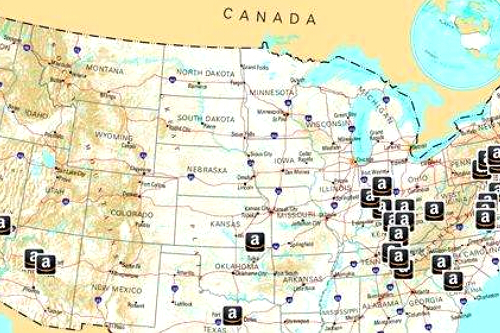These Cities Want Amazon’s Second Headquarters
Matt Day
Amazon put North America’s major cities into competition for its second headquarters with the surprise announcement that the retail giant was taking offers for a second home.
Whichever city wins Amazon’s “HQ2” will host up to 50,000 workers with salaries that could reach $100,000 annually.
The company said it’s aiming for a metropolitan area of at least 1 million residents, opening up, theoretically, a few dozen cities in the U.S., from New York to Tucson, Ariz., and a handful more in Canada. It’s unclear whether Amazon would consider a bid from a Mexican city.
In the U.S., cities are rolling out the proverbial welcome mat, with mid-size cities including Atlanta, Buffalo, Detroit, Kansas City and Sacramento expressing early interest.
The company also mentioned proximity to good universities and a pool of well-educated employees, particularly software engineers, to draw from.
Here are a few candidates observers have highlighted:
Chicago
Chicago Mayor Rahm Emanuel has already reached out to Amazon founder Jeff Bezos, the Chicago Tribune reported. Emanuel hopes to leverage the city’s promiximity to top universities, public transit, a busy international airport and its growing tech scene.
It has multiple sites that could fit Amazon’s 8.1 million-square-foot “HQ2”, and has had luck luring corporate headquarters from other cities, including McDonald’s (Oak Brook, Ill.) and ConAgra (Omaha).
One challenge Chicago and Illinois might face: Amazon will want major incentives, something the city and state might not be able to provide, given their significant financial problems.
Austin, Texas
Austin’s up-and-coming technology startup scene and liberal-leaning, laid back vibe has drawn comparisons to Seattle. The cost of living is relatively low, and, like Washington State, Texas doesn’t have an income tax.
Amazon also has a couple of natural ties to the city. Whole Foods, the company’s new stake in the grocery market, is based in Austin. Texas is also where Bezos spent part of his childhood, and has family roots; the billionaire owns more than 150,000 acres in the western tip of the state.
The e-commerce giant said that it will spend more than $5 billion to build another headquarters in North America. Amazon will stay put in its sprawling Seattle headquarters, and the new space will be “a full equal” with as many as 50,000 jobs, said founder and CEO Jeff Bezos.
Boston
The region’s universities, from Harvard to the Massachusetts Institute of Technology, churn out the business graduates and highly technical engineers Amazon hires in droves. Amazon has facilities in Boston. And in the suburb of North Reading, its robotics unit makes the machines that roam Amazon’s warehouses.
Denver
Denver has an up-and-coming tech scene, relative proximity to Seattle, and cost-of-living advantages over other potential hubs. And for Amazon, a company that has reshaped downtown Seattle in its image, the ability to be an immediate corporate champion in a city that lacks one could be inviting.
New York City
The nation’s largest city has been on an ambitious, state- and city-backed push to broaden its strengths in finance and media and into high-tech, but it is short on Amazon’s request for 8 million square feet of affordable office space.

Pittsburgh
The former steel capital boasts more affordable space for a campus than some other potential competitors. It’s home to Carnegie Mellon University, a technology powerhouse with a particular strength in robotics. And, in its courtship of ride-hailing service Uber, the city has shown a willingness to try to lean on big tech to spur economic growth.
San Francisco
The center of the high-tech universe runs from San Francisco south to Silicon Valley, a region home to the largest base of software developers in the U.S.
Amazon has a growing footprint in the area, with 970 open jobs listed there on Thursday, the second-most openings behind Seattle.
Housing and other costs would weigh against expansion. And the pickings for sprawling corporate campuses are slim after growth by the likes of Apple, Google and Facebook. The city’s housing crunch, and broader Bay Area cost of living, and traffic congestion, are years ahead of Seattle’s budding, big-city problems.
Toronto
The city sports a well-educated and diverse workforce. Greater Toronto has a history in a wide range of technologies, as the home of former smartphone king BlackBerry, and, more recently, clusters of researchers and startups working on artificial intelligence.








